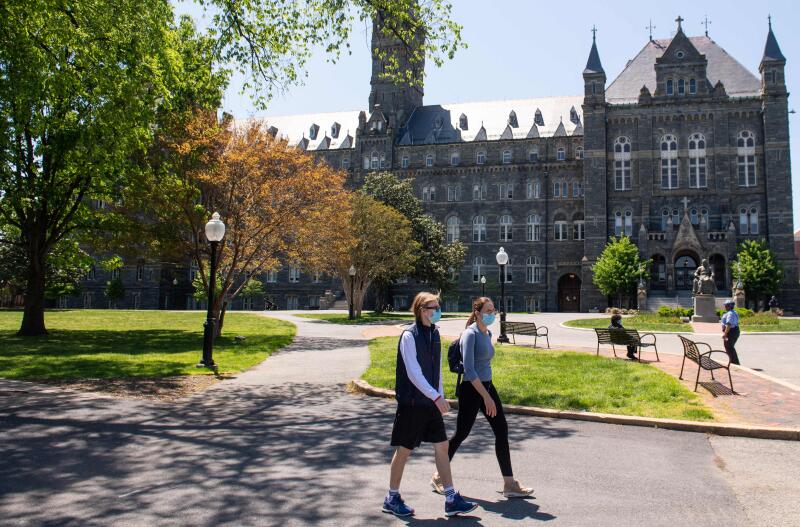Foreign students in the US will not get visas if courses shift to only online
Sign up now: Get ST's newsletters delivered to your inbox

More than 1.1 million foreign students are reported to currently have active US student visas.
PHOTO: AFP
Follow topic:
WASHINGTON - Foreign students and many schools and universities in the United States were shocked and confused by a notice from Immigration and Customs Enforcement (ICE) to the effect that students taking exclusively online courses no longer qualify for visas.
The problem: Many schools and universities are doing just that - moving online - at least for the near future to avoid having students in close proximity and risking further spread of the coronavirus that remains rampant in many states.
More than 1.1 million foreign students are reported to currently have active US student visas.
In a press release on Monday, ICE said: "The Department of State will not issue visas to students enrolled in schools and/or programmes that are fully online for the fall semester nor will US Customs and Border Protection permit these students to enter the United States.
"Active students currently in the United States enrolled in such programmes must depart the country or take other measures, such as transferring to a school with in-person instruction to remain in lawful status. If not, they may face immigration consequences, including, but not limited to, the initiation of removal proceedings."
The new guidance comes in the wake of a series of measures to restrict foreigners from US work and study, on the grounds that they take jobs that Americans could do at a time when the economy has flatlined due to pandemic-induced restrictions on businesses and gatherings.
But analysts see this as part of the Donald Trump administration's broader agenda to curb immigration in general.
"The Trump administration seems to be doing everything it can to stop all immigration to the United States," said Mr Stephen Yale-Loehr, a Cornell Law School professor and an adviser to the National Foundation for American Policy.
"Families are separated and employers can't bring in needed workers. These latest actions are hurting, not helping, our economy," he told Forbes magazine.
The latest guideline comes on the heels of a Presidential Proclamation on Immigration on June 22, which blocked H-1B, H-2B, J and L non-immigrants, who are outside the US on June 24 and without a valid visa or travel document, from travelling to the US at least until Dec 31. The measure would be periodically reviewed, and may be extended, the Proclamation said.
With many American schools announcing that the upcoming fall semester will be entirely online, the new guidance means enrolled students may have to up and leave the country, and students intending to enrol may have to reconsider study plans.
Institutions - currently in the process of figuring out how to proceed with the fall semester - will have to find a way to hold in-person classes or lose the foreign students, who are a major source not only of revenue, but of academic talent, especially in Stem (science, technology, engineering and mathematics) fields.
Harvard University on Monday (July 6) said it would offer only online classes for the 2020-2021 school year. Other institutions have yet to decide.
Students who go to schools operating hybrid models this fall, offering both in-person and online classes, will be allowed in the US as long as they are "taking the minimum number of online classes required to make normal progress in their degree programme" and not taking a fully online course, the ICE notice said.
"This ICE policy is backward and self-defeating," tweeted Mr Richard Stengel, a former undersecretary of state in the Barack Obama administration, and a distinguished fellow at The Atlantic Council.
"These foreign students bring in many billions to our GDP as well as promote our public diplomacy," he tweeted. "Narrow short-term thinking by Trump admin," he added.
"This is a win for nativists and isolationists, but a major loss for the US, both economically and in terms of soft power," tweeted Dr Elizabeth Popp Berman, associate professor of Organisational Studies at the University of Michigan.
Dr Esther Brimmer, executive director and CEO of the non-profit Association of International Educators, in a statement, said: "Our nation risks losing global talent with new policies that hurt us academically and economically."

